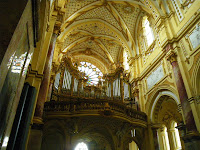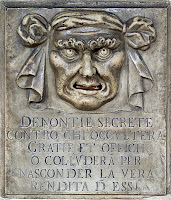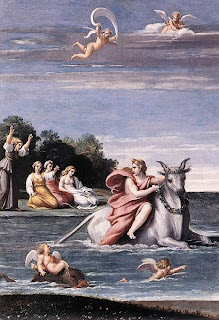Science maven Maggie Koerth-Baker, a few weeks ago, filed some very clever observations on longevity and the need for people to riddle out a formula or pattern for long, healthy lives--prefacing the dispatch with something to the effect, if a supercentenarian, whilst chain-smoking, eating chocolate, not exercizing, drinking red wine and turnip juice, jumped off a bridge from Okinawa to Andorra--would you do it too... No habit or diet is shared for those who reach extreme old age, though science is trying to fit it to a certain paradigm, but neither is it purely locked up in genetic predisposition.
Tuesday 23 August 2011
kwisatz haderach or struldbrugg
Monday 22 August 2011
boxcar
I thought that that was surely a sign, an omen that there was to be an imminent and spectacular dispensation of righteous reckoning with promised economic and political consequences for not sharing secrets.
These first three were part of a group found in the underpass by the canal dams of Bamberg.
The last grey one is an older picture, from 2005, found in a pedestrian tunnel in Luxembourg.
catagories: graphic design
Sunday 21 August 2011
legendary creatures or there be dragons here
I was reading about the discovery of a new dinosaur fossil that will take its scientific nomenclature from the legends of tormenting dragons that primative finds possibly inspired in the first place. The mythological beast, the Cyclopes, was also probably inspired by discoveries of the skulls of mammoths by ancient Europeans who did not know how to interpret an elephant relative’s remains. I was reminded of my own find while climbing the arid sands of the Great Wandering Dune of Pyla. I thought it was the bleached skull of a little dragon, but upon discovering more, I later realized it was probably the vertebrae of some real animal instead. I still like my little dragon skull, and behind it there is a white holey stone called an Adder stone (oder ein Hühnergott), a rock worn down by time and tide, and which was a talisman or charm for ancient people.
Friday 19 August 2011
rhein-main-donau
Driving to visit my parents after work, I finally took the time to stop along the way and investigate the imposing cloister complex at Markt Ebrach, formerly belonging to the Order of the Cistercians (or Trappists) Monks. I only walked around inside the glorious church, having before only seen it in passing, which was just surpassingly beautiful and unexpected with art, colour and ornament.
 The village boasted a wealth of other things to see, like sculpted gardens, a curiously fortified winter garden and brewery in addition to courtyards of the cloister. The Cistercian Order took vows of silence and removed themselves from the everyday world: these enduring buildings owing to their need to be self-sufficient. I will have to return for the complete tour when I can bring H along and can devote a few hours to the spectacle.
The village boasted a wealth of other things to see, like sculpted gardens, a curiously fortified winter garden and brewery in addition to courtyards of the cloister. The Cistercian Order took vows of silence and removed themselves from the everyday world: these enduring buildings owing to their need to be self-sufficient. I will have to return for the complete tour when I can bring H along and can devote a few hours to the spectacle.
 From the main street, just passing through and dodging traffic, the church and raised abbey garden are certainly eye-catching but I did not expect so much more on closer inspection. This entire stretch of road is beautiful but quaint and without ostentation or being sequestered--also, I was noticing, that a lot of towns and villages seemed to invoke matters bovine in their names, a lot with either the prefix Vieh- or the suffix -auroch. Vieh (cattle) gives us the English word fee, as livestock is a commodity. I might not have been right with -Auroch, though, recalling the primordial and now extinct European wild cow, the Aurochs (Auerochse oder Ur auf Deutsch).
From the main street, just passing through and dodging traffic, the church and raised abbey garden are certainly eye-catching but I did not expect so much more on closer inspection. This entire stretch of road is beautiful but quaint and without ostentation or being sequestered--also, I was noticing, that a lot of towns and villages seemed to invoke matters bovine in their names, a lot with either the prefix Vieh- or the suffix -auroch. Vieh (cattle) gives us the English word fee, as livestock is a commodity. I might not have been right with -Auroch, though, recalling the primordial and now extinct European wild cow, the Aurochs (Auerochse oder Ur auf Deutsch).
The Coat of Arms of Mecklenburg
features an Aurochs
|
Rather the Auroch is a tributary of the Regnitz river, which flows into the Main, then the Rhein and onto the North Sea, but I suppose the river could refer ultimately to the ancient, undomesticated bull.
manifest destiny
In an unrequited display of nostalgia for fading imperial muscle, the US Internal Revenue Service is poised to unleash a slew of regulations and reporting requirements that will make foreign banks and businesses unwilling agents of tax-collection. This cannot end well--given that--following the example in the article, a foreign bank with American holdings, investments, bonds, treasuries, has to expend caution, time and resources on the citizenship of each and every depositor-- and the money-lenders and underwriters may well avoid doing business with Americans altogether. Bankers and economists all over are deriding this parasitic hubris, not wanting to take the responsibility for doing a job that the US government cannot manage itself. America's tax regime, for individuals at least, is overly-ambitious and unique in that in seeks its share of earnings, regardless of where they were earned and where one lives--and this they demand outside of the arrangement of any standing tax treaty.
 Shirking one's obligations harms others, especially when one expects to be afforded the protections and support of one's country--however, I think this whole proposal is vindictive and misguided and won't repatriate revenue, the IRS already cannot handle its regular caseload though it expects to shift through the wisps of international banking, and also given that the US government might try to shake down, strong-arm and intimidate individuals for loose-change yet demand no taxes from its huge corporations, whose continued profits through tax-payer funded bailouts (Rettungspakets) have neither translated to creation of new jobs nor market stability.
Shirking one's obligations harms others, especially when one expects to be afforded the protections and support of one's country--however, I think this whole proposal is vindictive and misguided and won't repatriate revenue, the IRS already cannot handle its regular caseload though it expects to shift through the wisps of international banking, and also given that the US government might try to shake down, strong-arm and intimidate individuals for loose-change yet demand no taxes from its huge corporations, whose continued profits through tax-payer funded bailouts (Rettungspakets) have neither translated to creation of new jobs nor market stability.
catagories: America, economic policy, foreign policy
Wednesday 17 August 2011
aurora, not a palindrome
A team of Italian, Swedish, Russian and German astrophysicists, shifting through volumes of data, have discovered that there is a faint, disperse ring of anti-matter particles around the Earth. These particles, whose existence to me raises many questions by its confirmation, like: were they trapped by the strong magnetic fields whose lines of influence extend many thousands of kilometers beyond the atmosphere, are some cosmological readings, anomalies really the ghostly scintillations of anti-matter and normal matter meeting (e.g., the dark matter and dark energy conundrum or the Doppler shift or a hatful of universal constants), or even should it be more risky to attempt to break free of the mundane sphere than it seems to be, are apparently suspended within the van Allen radiation belts, which by virtue of scale make an ideal trap to keep at least some of the anti-particles from interacting with their everyday nemesi. How neat and exciting! On the practical side, researchers are now hailing the magnetosphere as a potential source of fuel for the next generation of space craft, carefully harvesting this volatile Bizarro substance, although the boundary between space and sky has always been known as an explosive and rich source of potential energy with cosmic rays in constant volley, if we were only smart enough to tap into it.
debenture or sweet lorraine
German and French senior leadership have been holding a series of coy summits in order bring some resolution to the sovereign debt crisis across the Eurozone, whose uncertainty has strained the economy globally--coupled with America's insolvency. One crisis is always serviceable to distract from the other, but I suppose that Germany was incited to action by reports out of Wiesbaden (Das Hauptsitz des Statistische Bundesamt) that the Wirtschaftswunder driving the markets of Europe had stagnated of late. Proposals of introducing Eurobonds, shares in public debt that have an equalizing effect on the interest-rates that states would incur for issuing more debt--Germany and France and other fiscally sound countries would share the same burden as Italy, Spain, Greece and Portugal, were roundly rejected, though some say it is a quick and effective fix for the euro, because Germany and France argue that such an institution is not conducive to economic integration at the onset but rather during the culmination. Level-growth for Germany and Europe is not as reassuring as unbridled progress, however, sustainment is nothing to be ashamed of. Besides, the level of confidence of Germany's customers, trade-partners determine who's buying what and makes up at least half the indicators of an exporters' financial health. Debt management certainly cannot go unaddressed, but no radical changes are being touted: rather than a "collective government," they are espousing a shared-governance under the established European Union legislative and executive frameworks with more time devoted to consensus building on tax-collection, trade- and market-regulation, and management of pensions. Maintaining a common-currency that does not impose common economic policies is a challenge--essential for allowing individual state to keep their national character.
 What is rumoured to be a significant topic of discussion, however, is the proposed financial transaction tax. How this will develop is complete speculation but it is not double-taxation or something to impede free-trade, rather, if it does glean something off the top from the frenetic activity of stock-brokers, it might prove to be a positive thing. For those who buy and sell but never hold a commodity for longer than a few seconds, maybe a market-tax might induce some stability and thinking beyond the horizon. Trades have been relinquished to computer algorithms that cause these wild variations from one minute to the next, especially on the US market--some brokerages are using computer-routines that spurs volume ever faster by considering the limits of the speed-of-light down a wire and adjust to make the way shorter. Taxing the blatant opportunists is not sour-grapes, but perhaps a way to tame markets and closer align stock-exchanges with the real economy.
What is rumoured to be a significant topic of discussion, however, is the proposed financial transaction tax. How this will develop is complete speculation but it is not double-taxation or something to impede free-trade, rather, if it does glean something off the top from the frenetic activity of stock-brokers, it might prove to be a positive thing. For those who buy and sell but never hold a commodity for longer than a few seconds, maybe a market-tax might induce some stability and thinking beyond the horizon. Trades have been relinquished to computer algorithms that cause these wild variations from one minute to the next, especially on the US market--some brokerages are using computer-routines that spurs volume ever faster by considering the limits of the speed-of-light down a wire and adjust to make the way shorter. Taxing the blatant opportunists is not sour-grapes, but perhaps a way to tame markets and closer align stock-exchanges with the real economy.
catagories: 🇩🇪, 🇪🇺, 🇫🇷, 🌍, economic policy
















